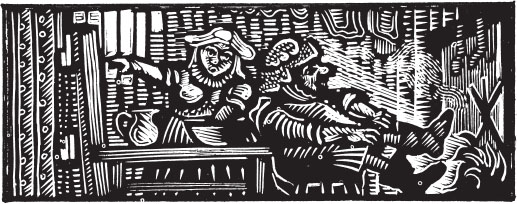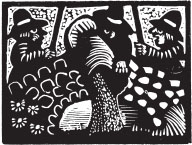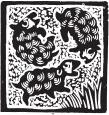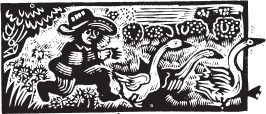

These are the most difficult of all tales to write down, as they inevitably lose something of their intrinsic nature in being separated from oral tradition and the vernacular.
The Last Word and ‘Get up and bar the door’
These two tales, the second in verse form, dwell on the age-old theme of contention between the sexes, in which the woman can almost always claim at least a moral victory.
She would always know best, and she would have the last word. If he said Sunday, she said Monday; if he said Easter, she said Christmas. Sometimes he grew tired of the argument, but it seemed to be the thing that kept her going. They grew older and older till he was bent and she was shrivelled, with a voice like a rusty saw; but still they argued, and still she managed to have the last word.
He had been recalling a tale from their young days, when she had had a bonnet trimmed with blue ribbons.
‘Green,’ she said.
‘No, blue. I’m sure.’
‘Green! You said at the time it was blue, but it wasn’t. It was green! We quarrelled about it, even then. But I know best. It was green!’
‘Ah, well! Have it your own way! All I know is that we quarrelled about it till I took my knife out o’ my pocket, and cut that ribbon clean off the bonnet.’
‘You did not! You used my scissors.’
‘I took my knife, out o’ my –’
‘Scissors! Scissors!’
‘Knife! KNIFE!’
‘Scissors, I tell you, SCISSORS!’
‘We shan’t settle it now, not if we are going to be where we’re going on time. So get your coat on missus,’ he said. She did. Her eyes were flashing, and he could see by the way she worked her mouth that she was ready to start the quarrel again as soon as they were out of doors.

Before they reached the gate, she said, ‘It was my bonnet, so I ought to know what colour it was. It was green. And you snatched up my scissors, and cut that beautiful green ribbon off.’
‘It was my knife, I used,’ he protested.
‘Scissors!’
‘Knife!’
‘Scissors, you numbskull! Scissors, I tell you! Scissors! Scissors! Why must you forever be contradicting me? Scissors it was, and scissors I’ll say, until my dying breath.’
They were passing, as it happened, by the side of a canal, deep, and dark, and dangerous. And he knew that what she had said was right, and that as long as she lived, she would always have the last word. So he took her by the shoulders, and tippled her head over heels into the canal.
‘Knife!’ he said, as she hit the water. Down she went; but after a few moments he saw her rising to the surface, wildly thrashing her arms. As soon as her head broke the water, she took a great gasp of air, looked towards him, and shrieked.
‘Scissors!’ was what she said.
‘Knife!’ he shouted back, as she disappeared again. The water was troubled, as she rose again more slowly, helplessly flailing her arms.
She raised her head a fraction, found him with her eyes, and screamed ‘Scissors!’ in a voice still defiant though choked.
The bubbles told him where to look for the third and last rising. Her head was below the surface, now, but her arms were still feebly moving over the dark water. He waited, carefully judging his time, then cupped his hands, and bawled ‘KNIFE!’ at the drowning figure. Slowly she began to sink, but at the last moment, her right arm rose till wrist and hand stood above the surface. Then she opened first and second fingers wide, closed them, opened them, closed them and so continued, till inch by inch the arm grew shorter, and the scissoring fingers disappeared for ever.
So she had the last word after all.
It fell about the Martinmas time.
And a gay time it was then,
When our goodwife got puddings to make,
And she boiled them in the pan.
The wind sae cauld blew south and north.
And blew across the floor;
Quoth our goodman to our goodwife,
‘Get up and bar the door.’
‘My hand is in my hussyfskep,
Goodman, as ye may see;
An it shouldna be barred this hundred year
It shall not be barred by me.’
They made a pact between them two.
They made it firm and sure,
That whoever should speak the very first word.
Should rise and bar the door.
Then by there came two gentlemen.
At twelve o’clock at night.
And they could neither see house nor hall,
Nor coal nor candle-light.
‘Now whether is this a rich man’s house,
Or whether it is a poor?’
But ne’er a word would one o’ them speak,
For fear of barring the door.
And first they ate the white puddings.
And then they ate the black;
Tho’ much thought the goodwife to hersel.
Yet never a word she spake.
Then said the one man to the other,
‘Here, man, take ye my knife;
Do ye shave off the auld man’s beard.
And I’ll kiss the goodwife.’
‘But there’s nae water in the house,
And what shall we do then?’
‘Why man, what ails the pudding broth,
That boils into the pan?’
O up then started our goodman.
An angry man was he:
‘Will he kiss my wife before my eyes.
And scald me with pudding-bree?’
Then up and started our goodwife,
Gied three skips on the floor:
‘Goodman, you’ve spoke the foremost word.
Now go and bar the door.’

Wise Men Three and The Twelfth Man
Here are just two of the many tales related about simple people acting with all the serious intent of the wise. Others tell of the truly wise pretending to be simple to gain their own ends. Both the stories below have now been firmly attached to Gotham, a village in Nottinghamshire.
A fellow from Gotham set out one morning for Nottingham. As he crossed the little humpbacked bridge, he met one of his neighbours going the opposite way.
‘Mornin’,’ says the neighbour.
‘Mornin’,’ says the other.
‘Where are you going?’ asks the neighbour
‘To Nottingham,’ says the other.
‘To Nottingham? What for?’ says the neighbour.
‘Marry, to buy sheep,’ answers the first.
‘To buy sheep, you say?’
‘Aye. To buy sheep.’
‘Which way will you bring them home?’
‘Marry! Over this bridge, of course.’
‘Nay! That thou shalt not.’
‘Who says so?’
‘I say so.’
‘Ah, then I will.’
‘Thou shalt not, I say!’
Then the man who was to buy the sheep looked about him, as if he already had them with him. He waved his stick to drive them on. The neighbour raised his stick to prevent their passage. The two met face to face, clutching their ash plants.
‘Tut here!’ says the first, bringing his stick down with a bang.
‘Tut there,’ says the other, glaring. Then they both began again to drive the imaginary sheep, with much whistling and calling and clouting of sticks upon the bridge.
‘Tut here!’ says the sheep buyer, catching his neighbour a hefty blow with his stick.
‘Tut there,’ replies the other, with a resounding whack.
After that the action waxed fast and furious, till both men were bruised from head to foot and out of breath, but neither the one nor the other would give in.
Then, after a time, up comes a third man from the village, with his horse and cart, taking a sack of head-corn to the miller’s to be ground. He looks at his two neighbours, and wonders what they can be at such loggerheads about. So he climbs down from his cart, and goes up to them.
‘What are ye doing?’ says he.
‘I say I will drive my sheep over this bridge!’ Says the one.
‘And I say he shall not,’ says the other.
Then they began tutting again, and striking at each other afresh, while the third man scratched his head in perplexity. When they paused for breath he asked:
‘Where are the sheep, neighbours?’
‘Marry!’ says the first. ‘Am I not on my way to Nottingham to buy them?’
Then the third man laughed, fit to burst his sides, at their foolishness.
‘Why! What a couple of numbskulls you are!’ he says.
‘Why?’ says one.
‘How?’ says the other.
‘Come now,’ says the third. ‘I’ll show you just what a pair of fools you are. Help me with this sack of corn.’
Looking foolish, the two neighbours watched as he urged the horse and cart to the brow of the little bridge. Then they helped to drag the heavy sack of corn to the edge of the cart.
‘Help me to get it onto my back,’ its owner commanded, and they obeyed, so that the sack sat on his shoulders. Then he staggered with the tremendous weight to the side of the bridge, and balanced the sack on the parapet.
‘Undo the top of the sack,’ he says; they obeyed him, wondering at his cleverness.
Then he gently inclined the sack, till the dry grains of corn began to flow like golden water from its mouth, and cascade over the parapet down into the stream beneath. When the last grain had fallen, he shook the sack by its bottom corners, to demonstrate its complete emptiness.

‘Now you numbskulls,’ he says. ‘How much wheat is there now in my sack?’
‘Marry, none,’ says one.
‘Tis empty,’ says the other.
‘Well,’ says the third. ‘That’s right. And there’s just as much wheat in my sack now as there is in both your heads put together, to set up a quarrel about driving sheep that so far ye have not got!’
The men of Gotham loved to go fishing. One day, twelve of them set out to spend a long happy day with rod and line. When they reached the river, they separated so as to leave each other a fair stretch of water. Some sat on the river bank, some stood in the water, and others leaned from the parapet of the little humpbacked bridge. The fish were biting well, and by the time the sun began to go down they had a really fine catch.
As they gathered their tackle together to set off for home, one of them said. ‘Well, that’s been a right good day, that has. What a good thing none of us fell in the river and got drowned!’
‘Yes,’ said another. ‘We ought to be truly thankful. I suppose we are all here? We’d better count, just to make sure.’
So they began to count. Again and again they counted.
‘How many do you make?’ said one to another.
‘I make eleven,’ was the answer.
‘Aye, and so do I,’ said another.
So each of them asked all the rest but the answer was always the same. Every man counted eleven others, and forgot to count himself. Then they all became very worried and distressed.
‘Neighbours,’ said the spokesman. ‘We have all counted us, and it is certain that where twelve set out, only eleven have gathered to go home again! One of our party is lost, maybe drowned! What shall we do?’ They began to discuss plans for setting up a search, but they were in such sorrow for the missing fisherman that none could think clearly, or decide.
While they still stood, trying to fix on a plan, along came a merry young fellow riding on a tolerably good horse, ambling along and singing happily to himself as he rode. When he reached the bridge, he found it occupied by the men of Gotham, who by this time were all wringing their hands in grief at the loss of a dear friend and neighbour.
The cheery traveller reined in his horse.
‘Well met, gentlemen,’ he said. ‘I can see that something is troubling you. Is there ought I can to help?’
‘Sir,’ said the spokesman. ‘We fear that one of our number is lost. Twelve of us came out fishing this morning, and we can count but eleven to go home.’
The stranger on the horse sat silently looking at them for a moment or two. Then he said. ‘What will you give me if I find the missing man live and well for you?’
‘We will give you anything we have!’ they all cried. ‘Anything you ask for!’
‘Will you give me your day’s catch?’ he asked.
‘With all our hearts, and welcome!’ cried the spokesman. ‘It would be little enough to pay to have our brother restored whole to us! Do you agree friends?’
‘Aye!’ ‘Aye,’ they all said. ‘Such help would indeed be cheap at the price.’
Then the fellow got off his horse, and asked them all to stand on the bridge, in a row with their backs to the parapet.
Tapping the first lightly on the chest, he said ‘One!’ and on to the next, ‘Two – and so on to the end. ‘Eleven! Twelve!’ he said. ‘See, here is the twelfth man.’
Then the men of Gotham broke into happy cries of relief and gratitude.
‘Sir,’ said the spokesman. ‘We can find no words to thank you enough for finding our lost neighbour for us. Take all the catch, with our thanks. We can now all go home as happy as we set out.’
So the cheerful rogue packed the fish in his panniers, and turned his horse towards the nearest market while the men of Gotham went back to their village rejoicing at their good luck in having met him just at the moment when they so much needed help.


The simpleton who cannot remember his errand unless he repeats it all the time, or repeats a message verbatim to the wrong person and so confuses a plain issue, is a favourite in many cultures. Almost every village has its own variation on the theme, as, for instance, the child who adds to the message a remark not intended to be passed on. ‘A penn’orth o’ skim please, but Mam says not the blue cow’s milk today’, or ‘A pound o’ belly pork for Mam, but she don’t want no hairs and no tiddies’, etc. (Blue cow’s milk is milk suspected of being watered down.)
‘Come you here, Jacky,’ says the neighbour. ‘I want you to go to the butcher’s, and get me a watch and chain.’
‘A watch and chain. From the butcher’s,’ says Jacky, who was a bit on the simple side.
‘He’ll know what I mean,’ says the neighbour. ‘I gets one every week. Sheep’s head and pluck, liver and lights an’ gall an’ all.’
Off Jacky goes, but soon stops to watch a dog chasing a rabbit, and dawdles on till he forgets his errand.
‘What’s the matter?’ says the washerwoman, coming down the path with her wicker clothes basket.
‘I can’t remember what I’m going to fetch,’ says the boy.
‘You should ha’ brought your brother with you,’ says the washerwoman. ‘Two heads are better than one if they are only sheep’s heads.’
‘That’s it!’ says the boy. ‘That’s the very thing. Sheep’s head and pluck! Liver an’ lights an’ gall an’ all.’
Then away he goes again, running, till he catches his foot against a tussock and tipples head over heels, scraping his knee against a stone. And the sight of his own blood sets him crying, so that when he’s wiped his eyes on his sleeve he can’t think what his errand is. But it comes back to him bit by bit, and he makes up his mind to go on saying it out loud to himself, all the way to the butcher’s.
‘Liver an’ lights an’ gall an’ all!
Liver an’ lights an’ gall an’ all’
he says, over and over again. Then he hears queer noises coming from behind the hedge, and hops up on to a gate to see what can be causing them, and there stands a chap, bent nearly double, retching so hard as nearly to throw his heart up.
‘Liver an’ lights an’ gall an’ all!
Liver an’ lights an gal an’ all’
says the boy, watching with interest.
The sick man hears him, and between his spasms stands up and fetches him a clout round the ears.
‘You young varmint!’ he says. ‘If you must say something, say something sensible. Say, “God! Let nothing more come up!”’
So the boy makes off as quick as he can, repeating his errand as he goes:
‘Dear God, let nothing more come up!
Dear God, let nothing more come up’
till he comes to a field where there’s a fellow sowing wheat broadcast from a basket hanging round his neck, and stops to watch.
‘What’s that you’re saying? You little ’umbug. I’ll teach you not to make fun o’ me,’ says the sower, thumping him on the back. ‘Here’s what you must say – “Please God, send plenty more here!”’
The boy’s glad enough to get away, so on he trots, still repeating his message aloud so that he shan’t forget it:
‘Please God, send plenty more here!
Please God, send plenty more here.’
Then his way takes him through a churchyard, where parson and people are standing round an open grave. And he stops to gape, saying, ‘Please God, send plenty more here!’
But the parson hears him, and says, ‘You young infidel, what do you mean? You must say, “Pray Lord, take the soul to heaven.”’
Well, after that he has to go through a farmyard, where a touchy old farmer and his men are just getting ready to string a couple of dogs that have been worrying the sheep; and he stands still to watch, saying,
‘Pray Lord, take the soul to heaven!
Pray Lord, take the soul to heaven.’
Then the Farmer hears him, an’ breaks into a great guffaw, and says, ‘Numbskull, it’s only a dog and a bitch a-going to be hung! Now be off with you!’
Off he goes again, still saying his errand so he shan’t forget it, and meets a wedding party just setting out for church in all their finery. And while he stands to view the grinning bridegroom and the simpering bride, he says
‘Only a dog an’ a bitch, going to be hung!
Only a dog an’ a bitch, going to be hung.’
But the bride’s father hears him, and shakes him till his teeth rattle. ‘Of all the himpudent young rascals!’ says the father. ‘You must mind what you’re a-saying! You must say, “I wish both of you joy.”’
‘Ah,’ says the simpleton. ‘That I will. I wish both of you joy.’
Then they let him go, and before long he comes across a couple of men drunk in a ditch, trying to get out.
‘I wish both of you joy,’
says the lad. ‘I wish both of you joy.’
And one of the men hears him, and is so aggravated that he gives a mighty heave and gets himself out. Then he sets about young Jacky, and thumps him with his fist, till he’s right out of breath.
‘What you mean is, “One of ’em’s out and I wish the other was.” ’
‘One is out, an’ I wish the other was,’ says the boy, and takes to his heels as fast as he can, till he meets a tramp sitting by the roadside eating his snack from a red handkercher. And he stops to stare, because the tramp has only got one eye, and a black patch over the other. And he gazes at the tramp, saying loudly, so as not to forget his errand, ‘One is out, and I wish the other was.’
Then the tramp gives a roar like a mad bull, and grabs hold of him, threatening him with his jack-knife.
‘You imp of the devil!’ he says. ‘What you mean is, “One side gives good light. I only wish the other did.”’

Jacky says it after him, till the tramp lets him go and soon he comes to the village. There he finds the butcher’s shop afire, and the butcher and all his neighbours rushing about like a lot of old hens when a fox has got into the henhouse. All the time he keeps on saying,
‘One side gives good light. I only wish the other did.’
When they hear him say this, they reckon as how it must have been him that set the place afire, so they ties him up and takes him off to the justice of the peace, and goodness only knows what happens to him after that. Some say that he ends up in prison, and some that he gets hung in the course of time, ’cos nobody is able to make top or bottom of what he says. Anyway, the neighbour never got her watch and chain from the butcher’s and all on account of the boy not being able to call to mind what it was he had to ask for.